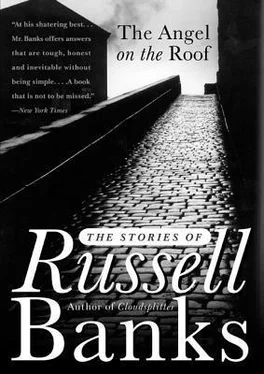Rifle in hand, Noonan stomped in silence past the departing crowd, his gaze fixed rigidly on something inside, a target in his mind of a silhouetted bear. No one spoke to him or caught his eye as he passed; no one looked at his back, even, when he strode into the kitchen and the door swung shut behind him. The men who had stood with him on the deck outside were ashamed now to have been there. Making as little of it as possible, they joined their wives and friends, all of whom were lined up at the cash register, paying Gail, leaving cash on the table, or paying Stacy at the bar, and quickly heading for the parking lot and their cars. There were a few stunned, silent exceptions, older kids too shocked to cry or too proud, but most of the children were weeping, and some wailed, while the parents tried vainly to comfort them, to assure them that bears don’t feel pain the same way humans do, and the man who shot the bear had to shoot it, because it was damaging his property, and not to worry, we will never come to this restaurant again, no matter what.
When everyone had left, Gail walked slowly from the dining room to the bar, where she took off her apron, folded it carefully, and set it on a barstool. “That’s it for me,” she said to Stacy. With trembling hands, she knocked a cigarette loose from the pack and lighted it and inhaled deeply. “Tell him he can mail me my pay,” she said. “The fucker.” She started for the door and then abruptly stopped. Without turning around, she said, “Stacy? Why the hell are you staying?”
“I’m not.”
In a voice so low she seemed to be talking to herself, Gail said, “Yes, girl, you are.” Then she was gone.
Stacy flipped off the lights in the bar and dining room one by one, unplugged the roadside sign, and locked the front entrance. When she pushed open the door to the kitchen, Noonan, standing at the far end of the long, stainless steel counter, looked up and scowled at her. He had cooked the last lobster and was eating it, eating it off the counter and with his hands: broken shells and the remains of its shattered carcass lay scattered in front him. He poked a forefinger into the thick, muscular tail and shoved a chunk of white meat out the other end, snatched it up, and popped it into his mouth.
“Eight fucking shots it took me!” he said, chewing. “That’s what I get for stashing that goddamn pissant.22 here instead of laying in a real gun!” He waved contemptuously with the back of his hand at the rifle propped against the counter, and with his other hand pushed more lobster meat into his mouth. His face was red, and he was breathing rapidly and heavily. “I missed the first shot, y’know, only because I was so pissed off I didn’t concentrate. But if I’d had a real gun, that second shot would’ve done the job fine. By God, tomorrow I’m bringing in my 30.06!” he declared.
Stacy picked up the.22 rifle and looked it over. She slid it into shooting position against her right shoulder and aimed along the barrel through the screened door and the fluttering cluster of moths to the outside lamp.
“Is it still loaded?” she asked.
“There’s four rounds left, so don’t fuck with it.” He yanked the spindly legs off the underbelly of the lobster and sucked the meat from each and dropped the emptied tubes, one by one, onto the counter in front of him.
Slowly, Stacy brought the rifle around and aimed it at Noonan’s skull. “Noonan,” she said, and he turned.
“Yeah, sure.”
She closed her eyes and pulled the trigger and heard the explosion, and when she opened her eyes, she saw in the middle of Noonan’s broad, white forehead a dark hole the size of a dime, which instantly expanded to a quarter, and his large body jerked once as if electrocuted and flipped backwards, his astonished face gone from her sight altogether now, and she saw instead, the back of his head and a hole in it the size of a silver dollar. His body, like a large, rubberized sack of water, fell to the floor, spinning away from her as it descended and ending flat on its back, with Noonan’s wide open eyes staring at the pot rack above the counter. Blood pumped from the hole in the rear of his skull onto the pale green linoleum and spread in a thickening, dark red puddle slowly toward her feet.
She lay the rifle on the counter beside the broken remains of the lobster and crossed to the stove, where the pot of water was still boiling, and shut off the gas flame. Slowly, as if unsure of where she was, she looked around the room, then seemed to make a decision, and perched herself on a stool next to the walk-in refrigerator. She leaned her head back against the cool, stainless steel door and closed her eyes. Never in her life, never, had Stacy known the relief she felt at that moment. And not since the moment before she was struck by lightning had she known the freedom.
A rattling Ford pickup truck stopped beside the darkened roadside sign, and the LaPierre brothers, Donny and Timmy, leaped from the truck bed to the side of the road. “Hey, good luck with ol’ Noonan, you little assholes!” the driver said, and he and a male passenger in the cab cackled with laughter. Two beery, expansive carpenters, they were cousins of the LaPierres, heading home to their wives and kids late from the bars of Lake Placid. They waved cheerfully to the boys and pulled away.
Donny and Timmy crunched across the gravel parking lot. The kitchen light and the lamp outside were still on, and when the boys were halfway across the lot, they saw Stacy through the screened door seated on the stool by the big walk-in fridge. She was asleep, it looked like, or maybe just bored out of her mind listening to one of Noonan’s dumb hunting stories.
“You think he’s screwing Stacy?” Timmy asked.
“C’mon, man. Stacy’s a babe. And he’s ancient, man,” Donny said. “It’s cool she’s still here, though,” he added. “She likes us, and he’ll hire us back just to look good.”
“I wouldn’t mind a little of that myself.”
“A little of what?”
“Stacy, man!”
Donny punched his younger brother on the shoulder. “Yeah, well, you’ll hafta wait your turn, little fella!” He laughed. He waved away the swarming cloud of moths and pulled the screened door open. Timmy entered first, and Donny, hiding his fading grin behind his hand, followed.
When I began writing, I wanted to be a poet, but had not the gift and fell in love instead with the short story, the form in prose closest to lyric poetry. In the intervening years, I’ve written a dozen or so novels, but the story form thrills me still. It invites me today, as it did back then, to behave on the page in a way that is more reckless, more sharply painful, and more broadly comic than is allowed by the steady, slow, bourgeois respectability of the novel, which, like a good marriage, demands long-term commitment, tolerance, and compromise. The novel, in order to exist at all, accrues, accretes, and accumulates itself in small increments, like a coral reef, and through that process invites from its creator leisurely, circumambulatory exploration. By contrast, stories are like perfect waves, if one is a surfer. Stories forgive one’s mercurial nature, reward one’s longing for ecstasy, and make of one’s short memory a virtue.
As this book is published, I am turning sixty, and these stories represent the best work I have done in the form over the thirty-seven years since I began trying to write in prose — at least that’s my hope. Rereading them has been like visiting my past and all-but-forgotten selves, the man I was (and was not) in my twenties, thirties, forties, and so on. To my surprise, the youth who wrote “Searching for Survivors,” one of the earliest of the stories included here, although a somewhat melancholy and self-dramatizing fellow, turns out to be not significantly different than the quickly aging man who wrote the most recent, “Lobster Night.” I suppose that should comfort me, but in fact it does not. It is, however, why I have arranged these stories thematically and dramatically, rather than in chronological order or by the titles of the collections in which they originally appeared. Because I was, when young, in many crucial ways the same writer I am today, I have felt free to take the old stories and set them beside the new, to recontextualize them. This has let me see them freshly and has allowed me to put them to a different use than when they were first written and published. In that way, in the making of this book, I’ve been able, despite my similarities to the younger person who has been using my name for these many years, to become a different writer than I was without it.
Читать дальше












